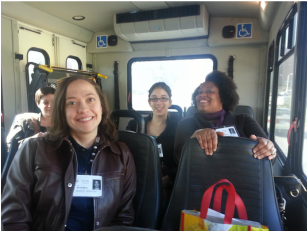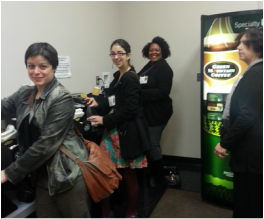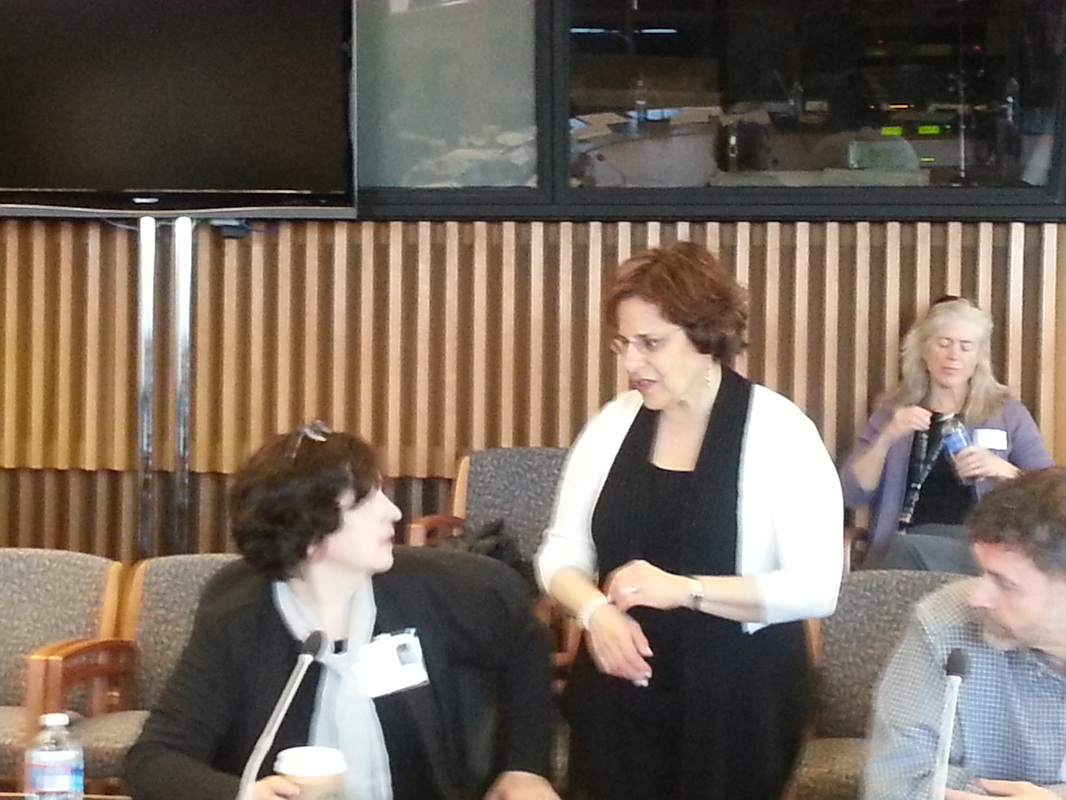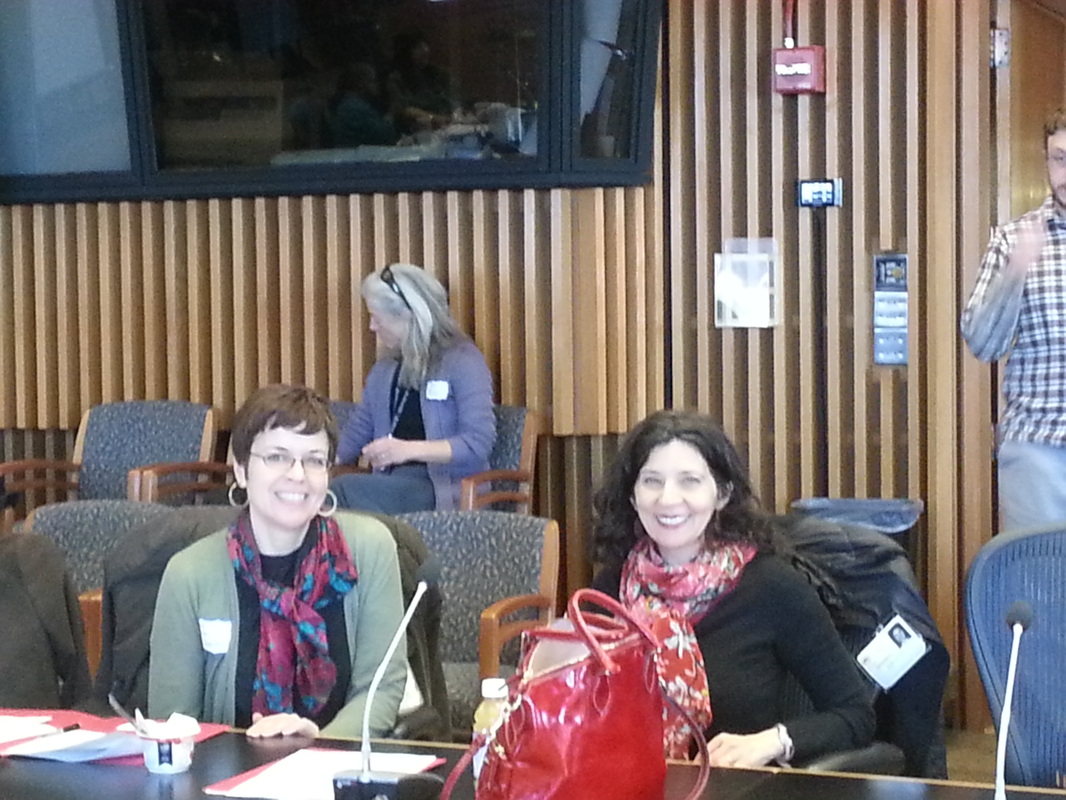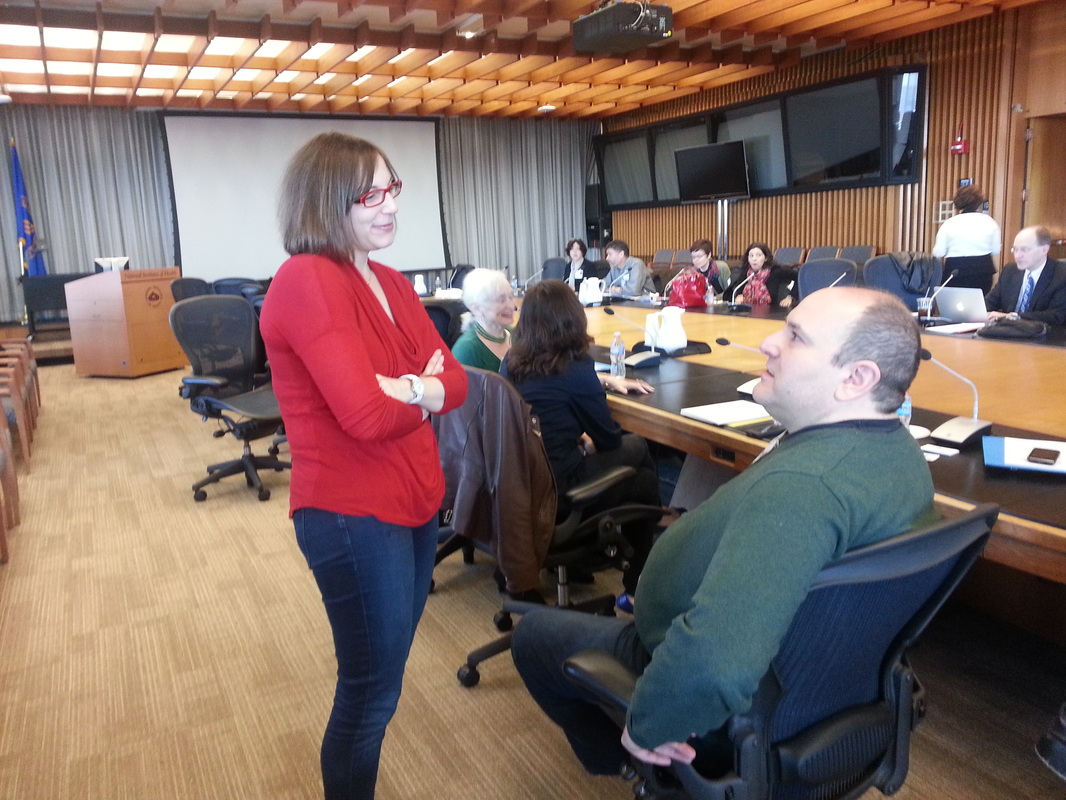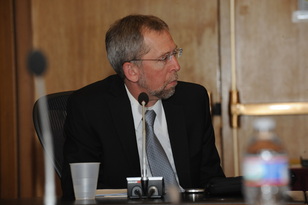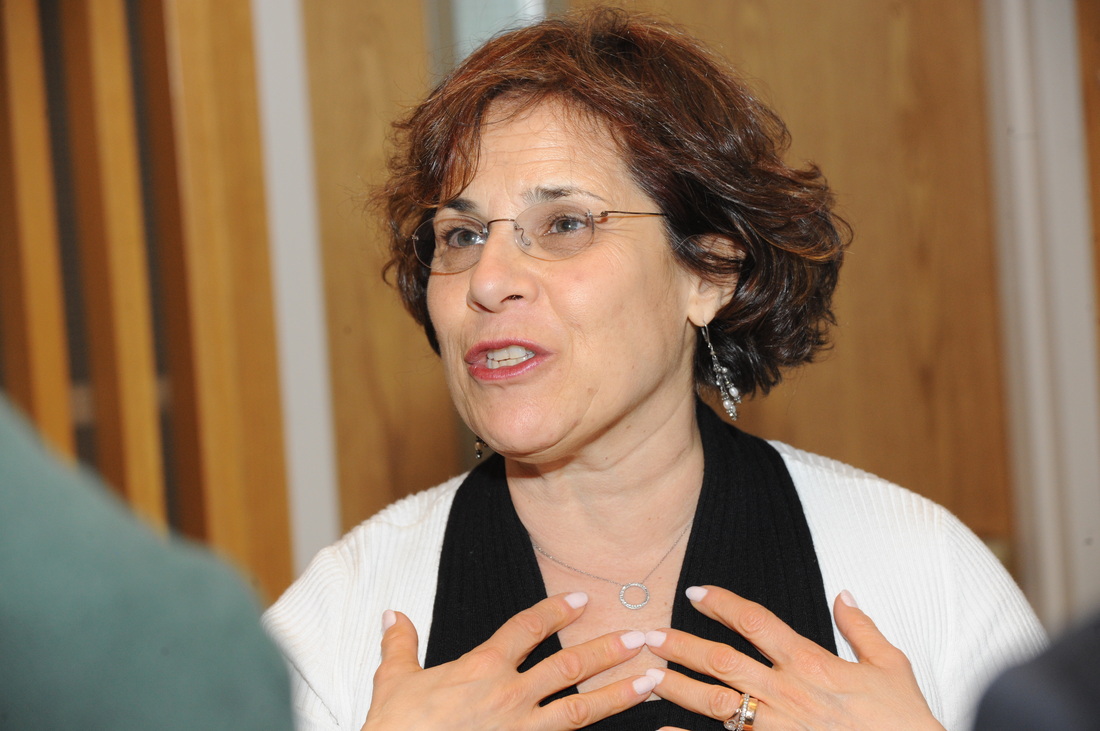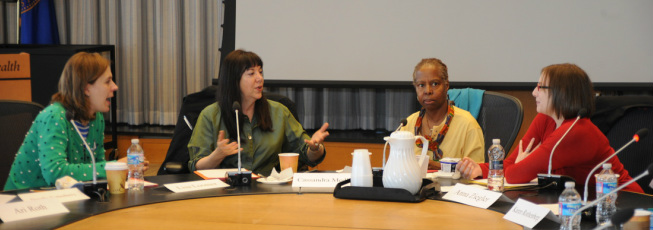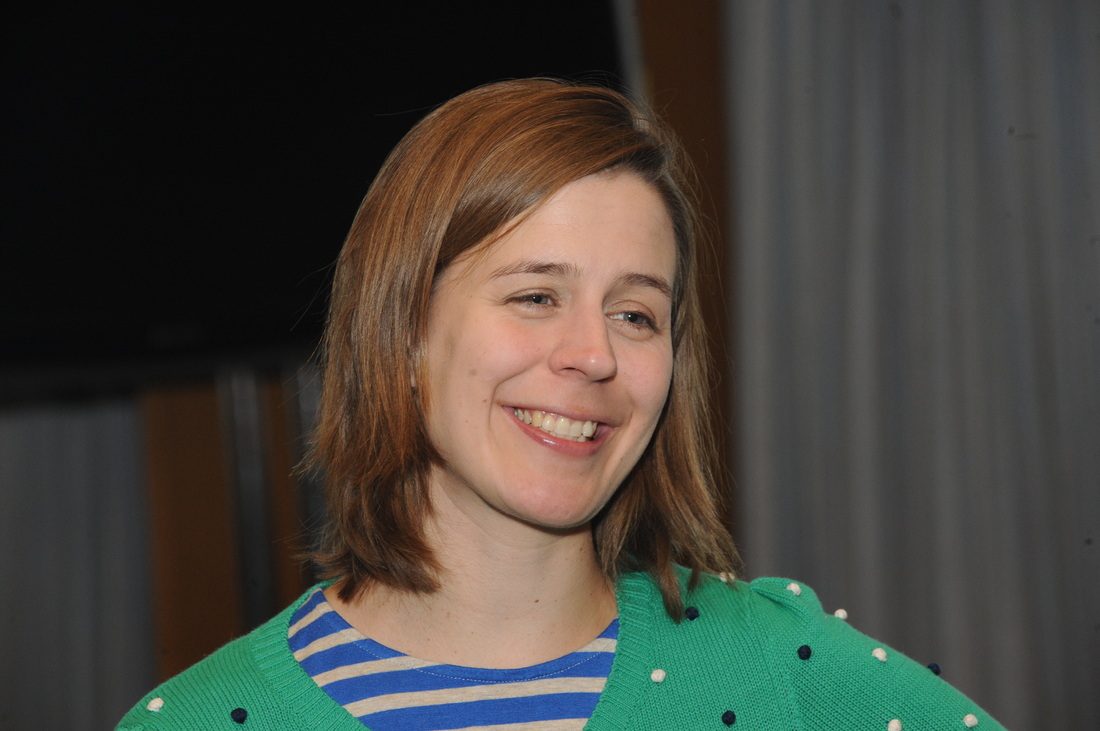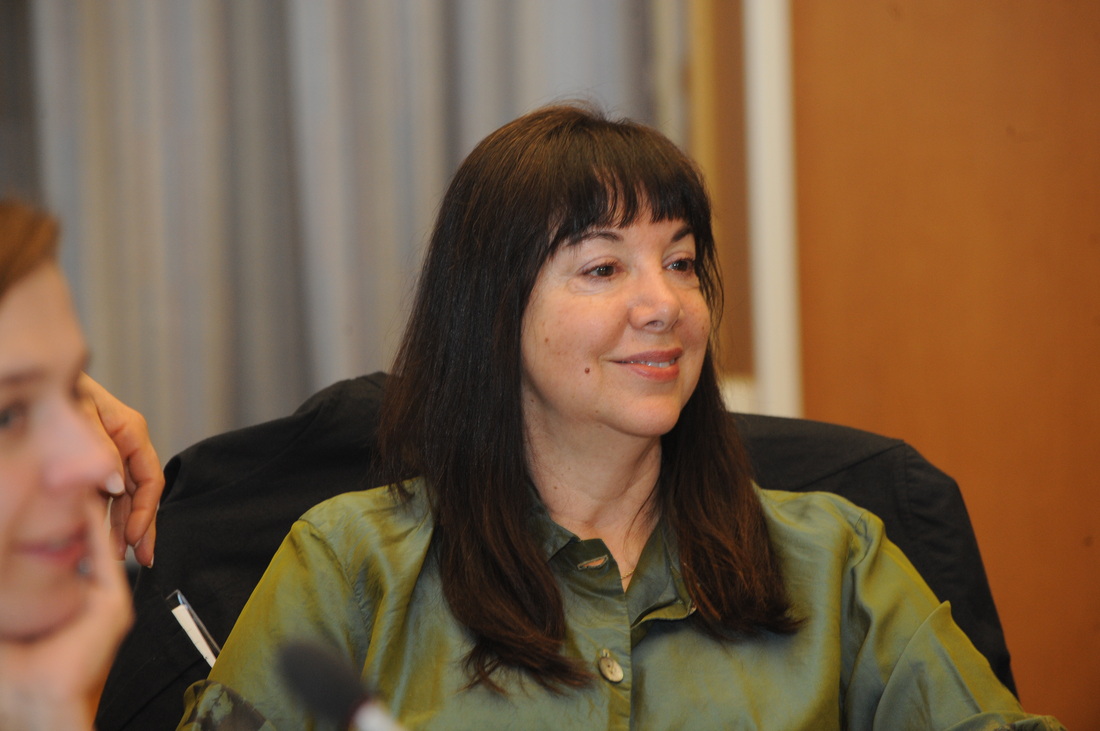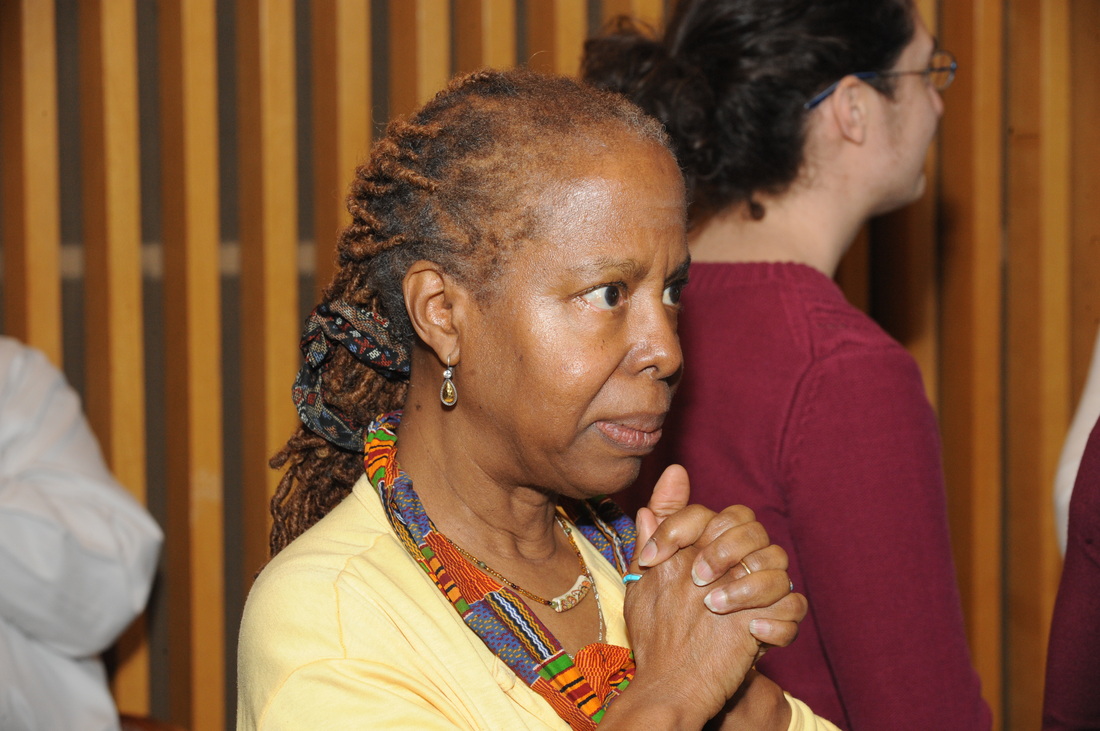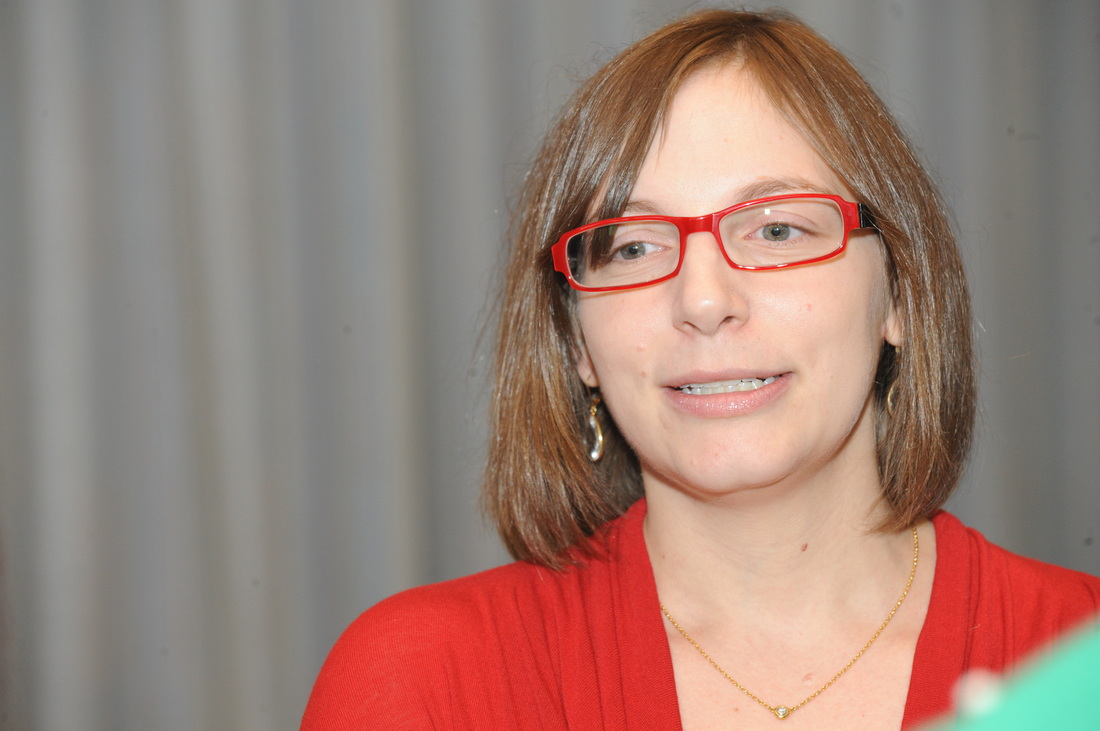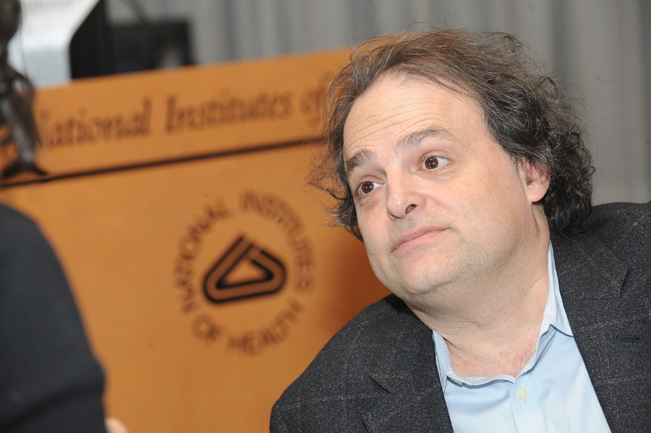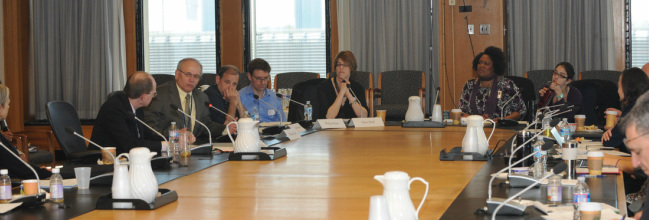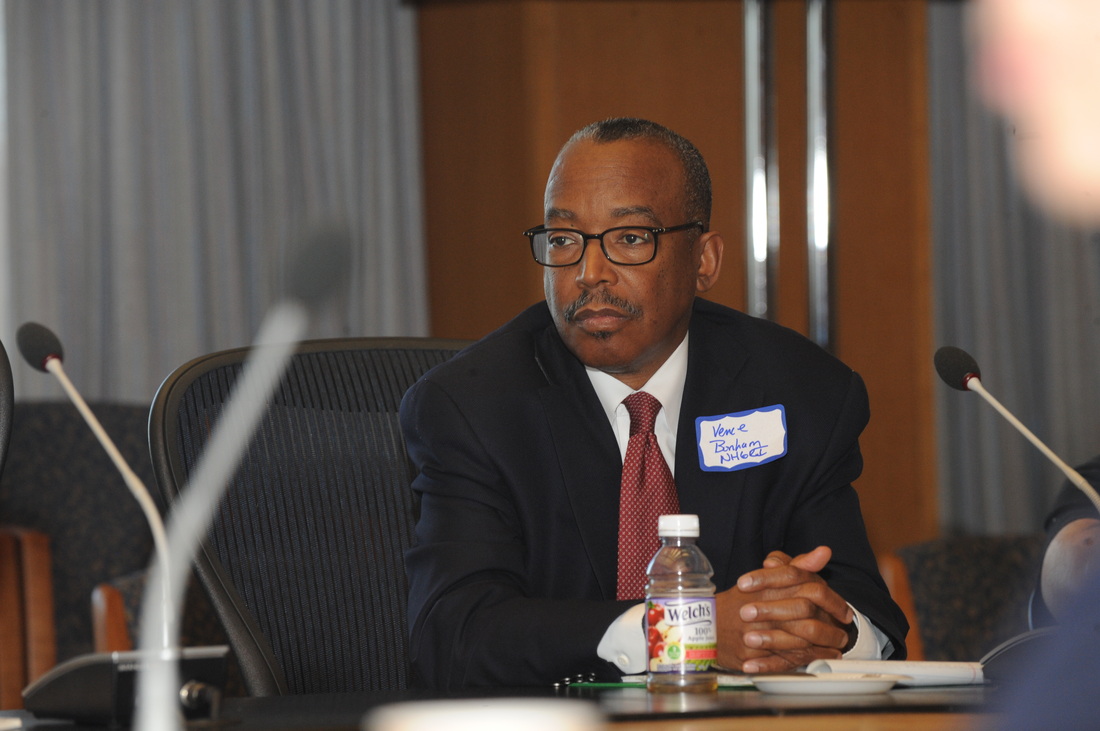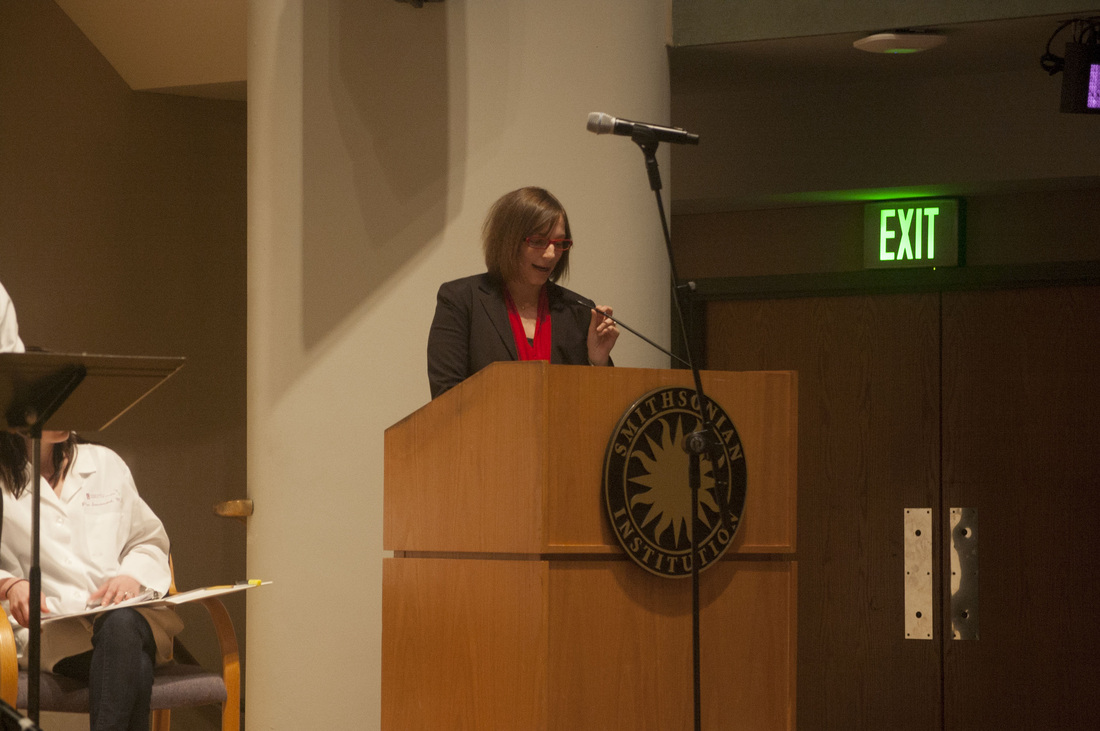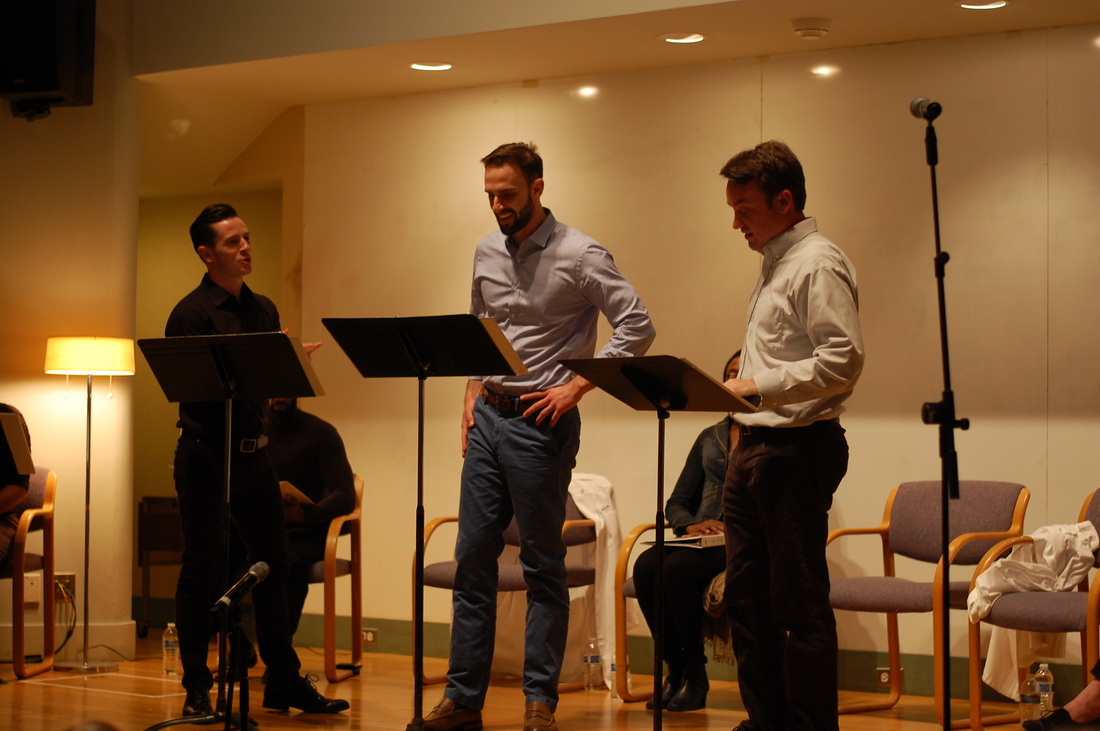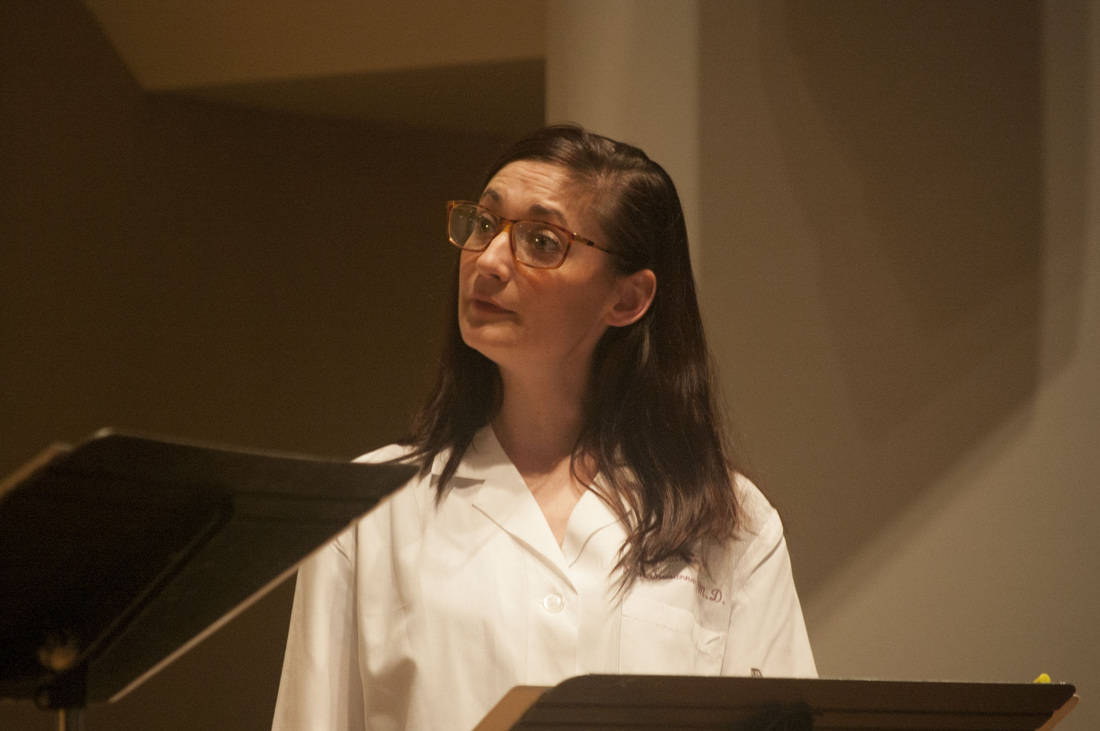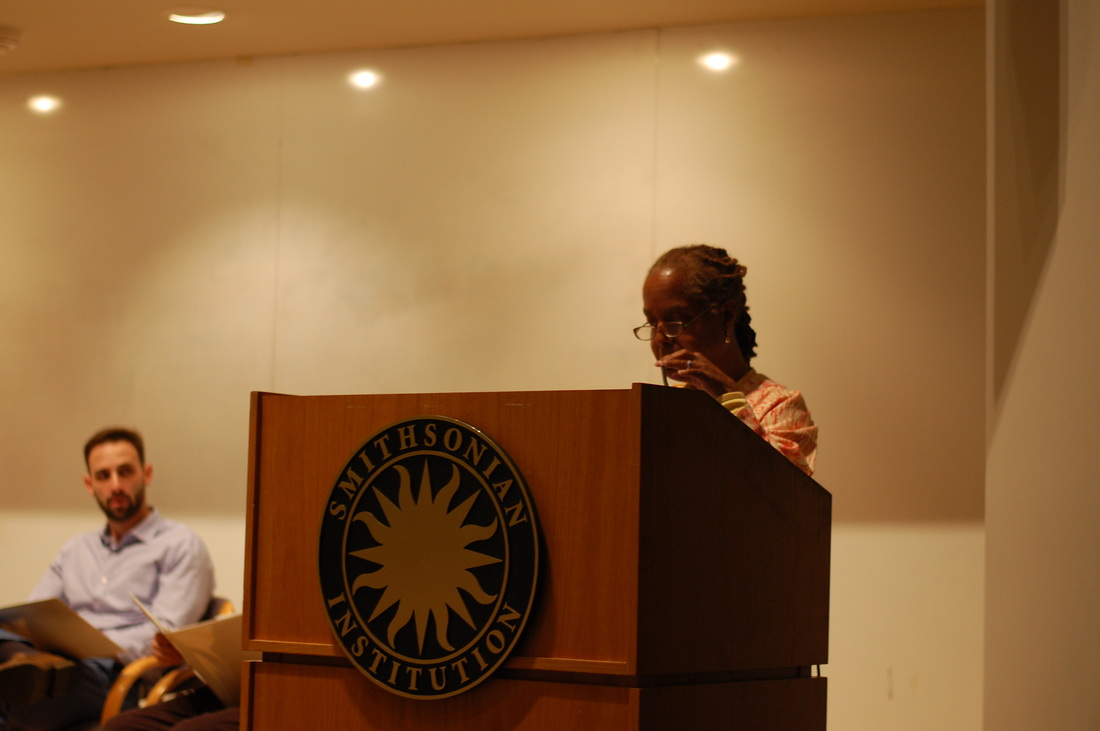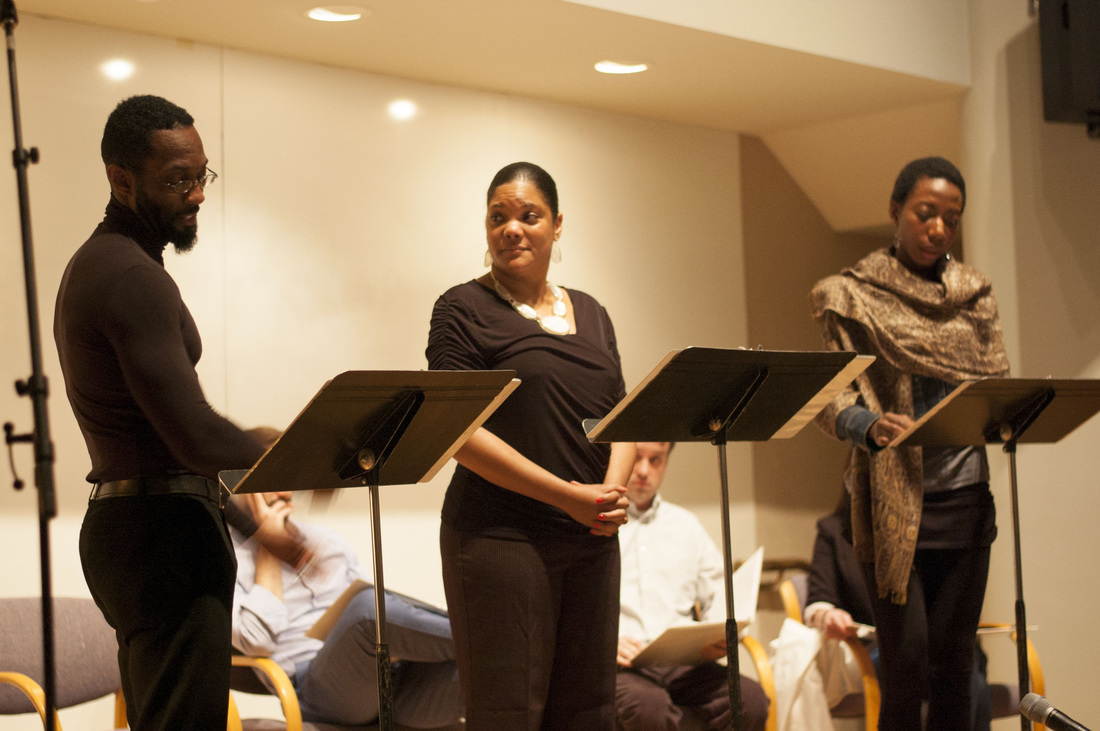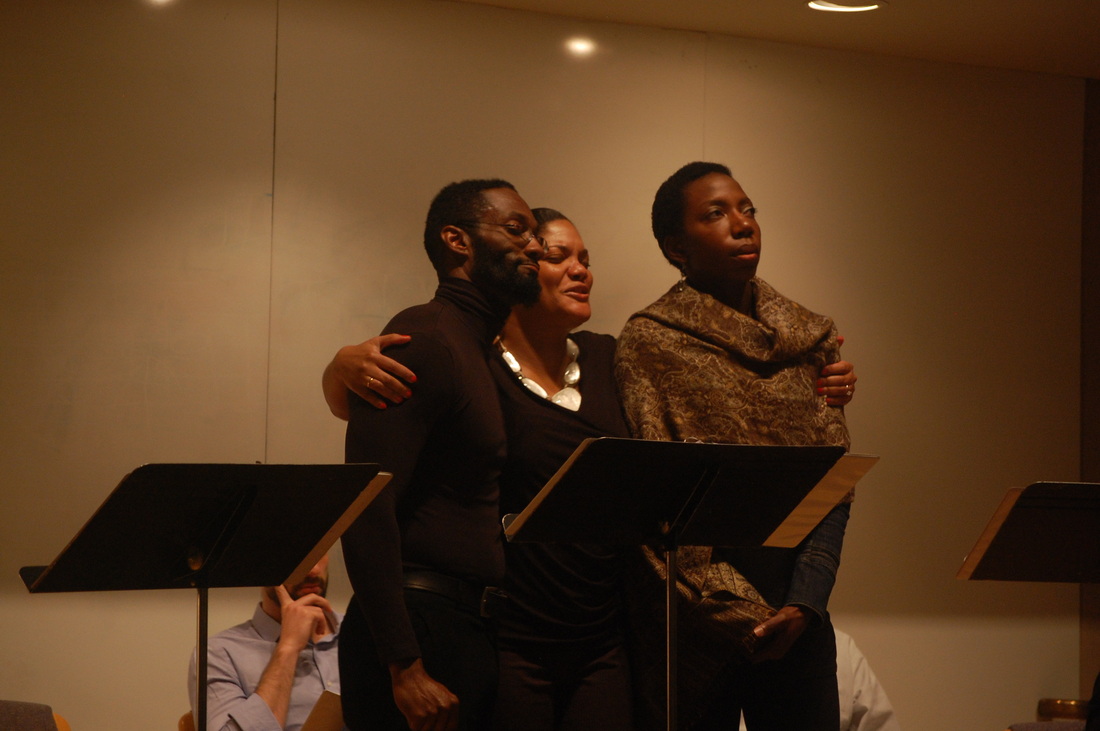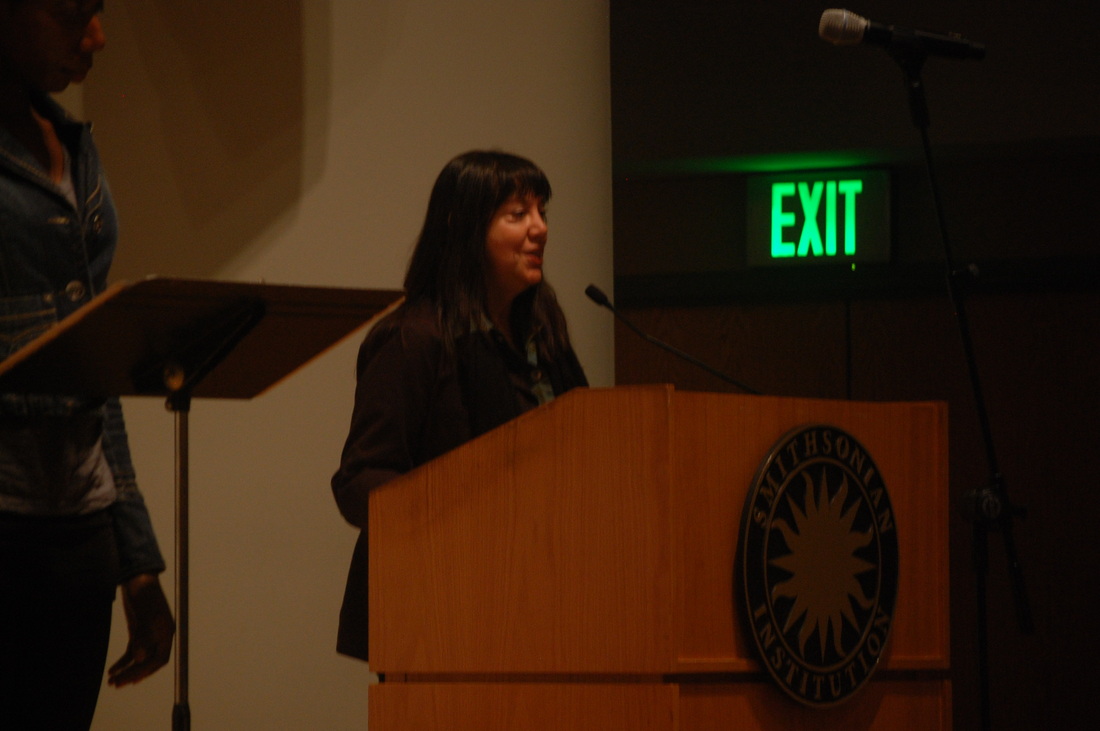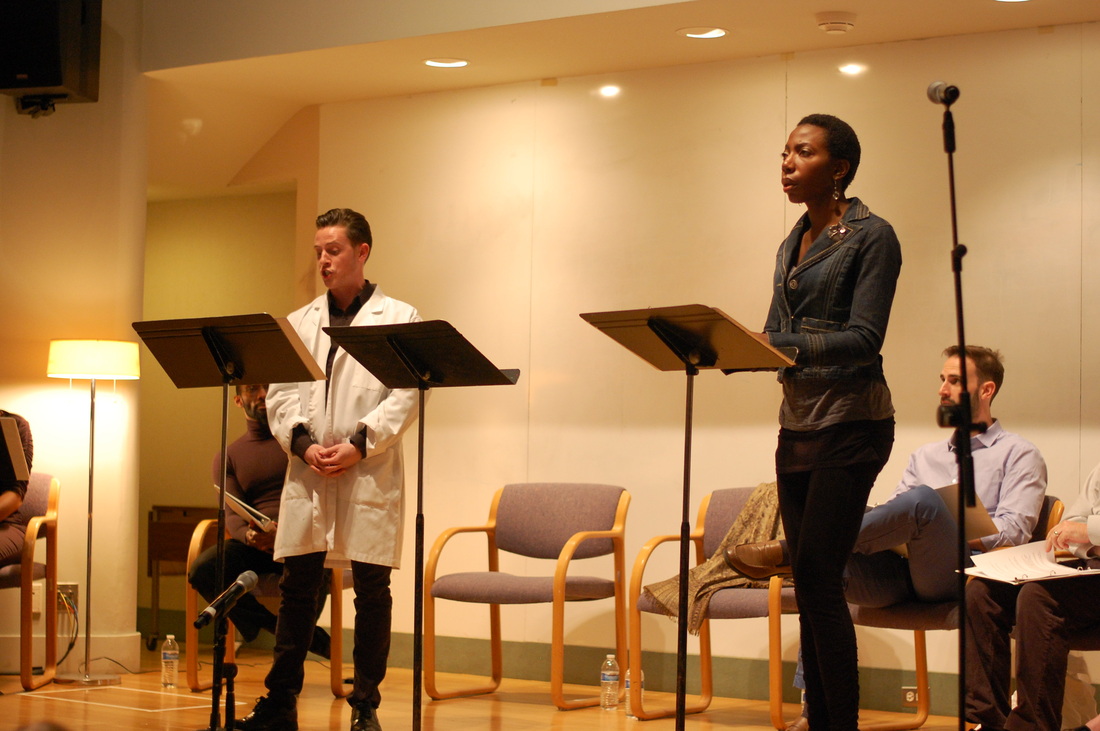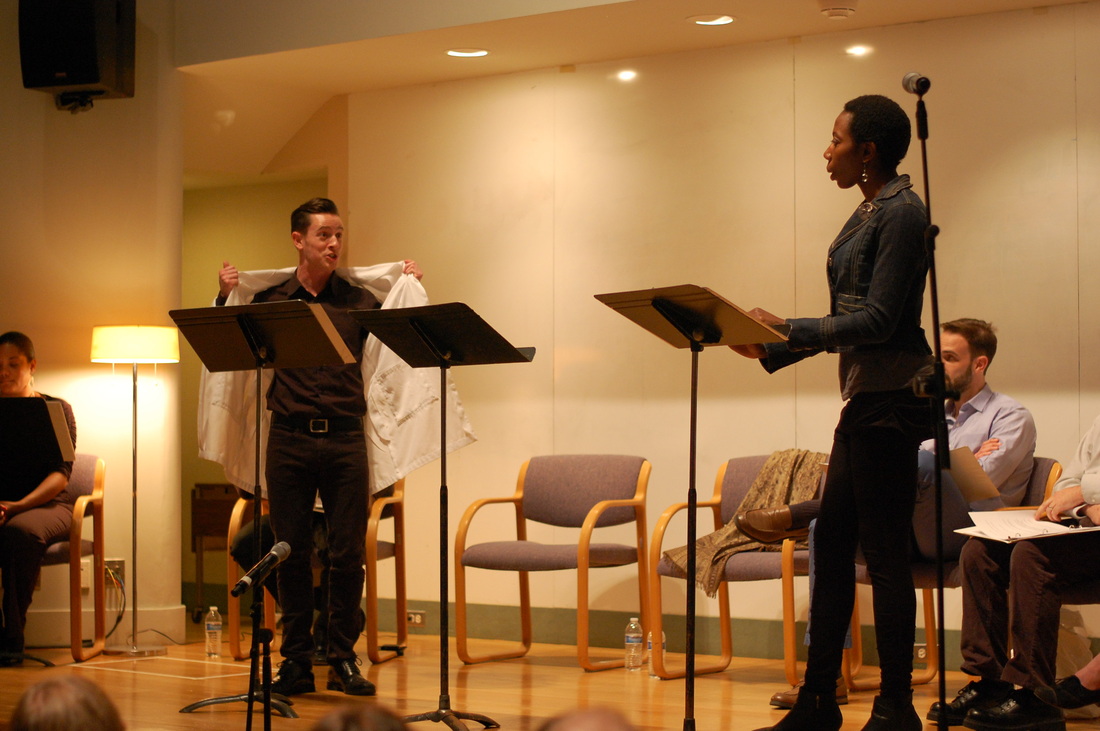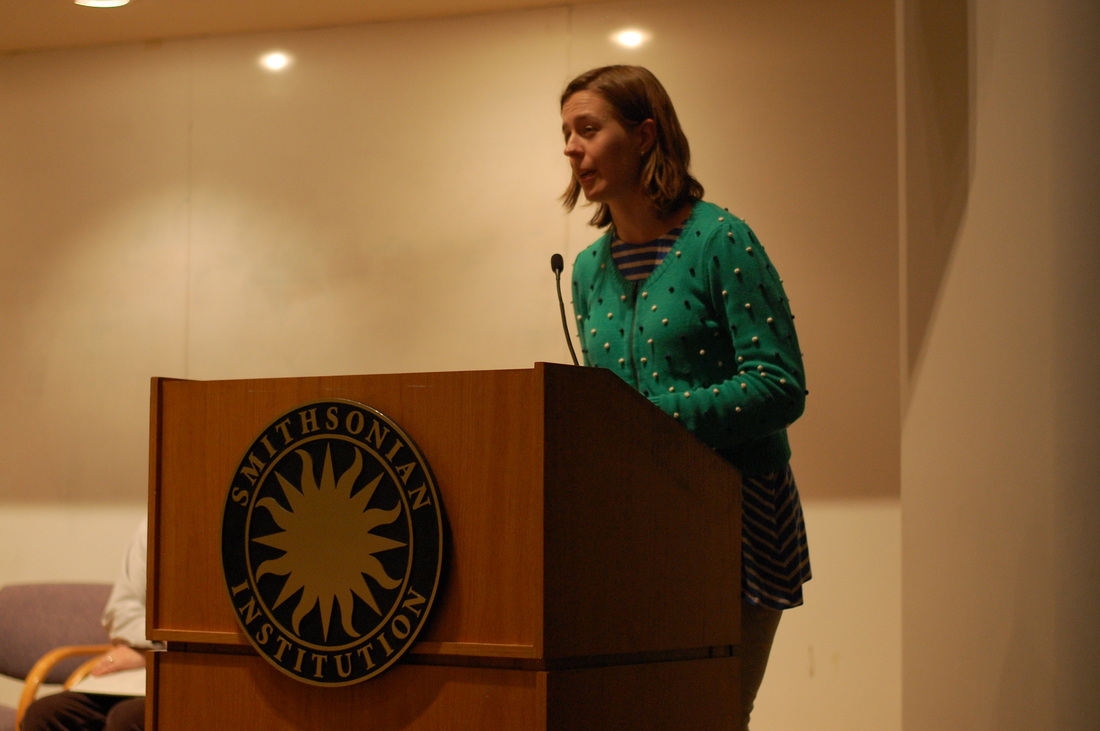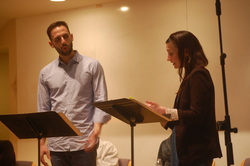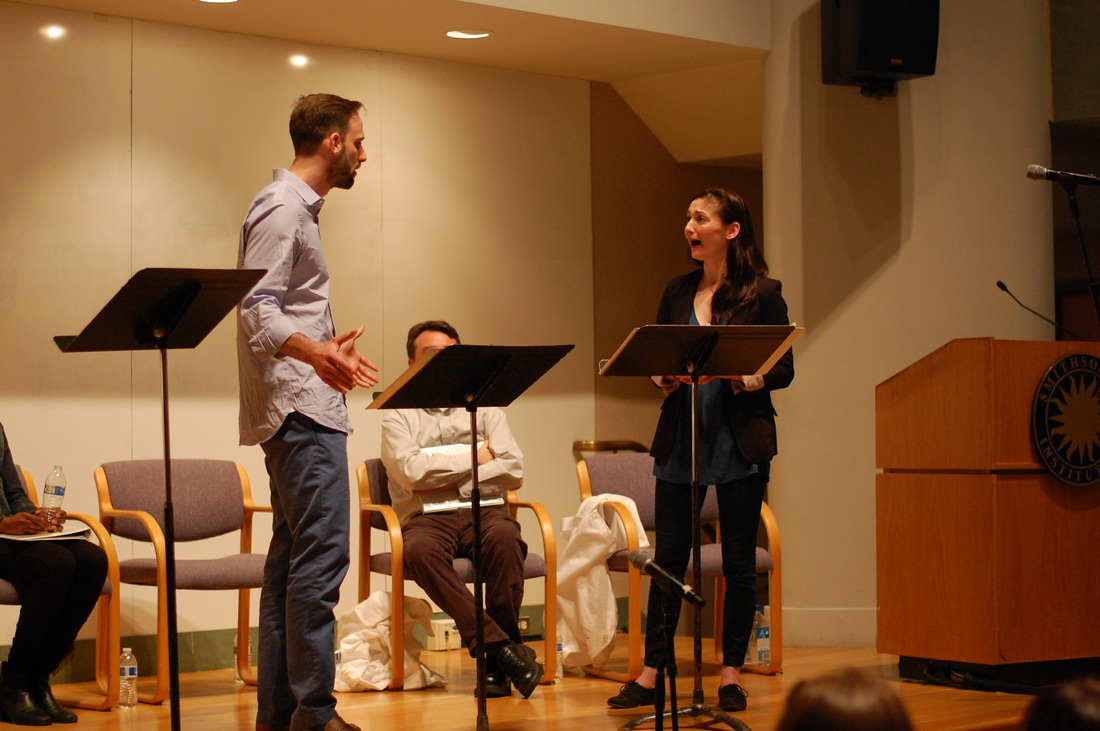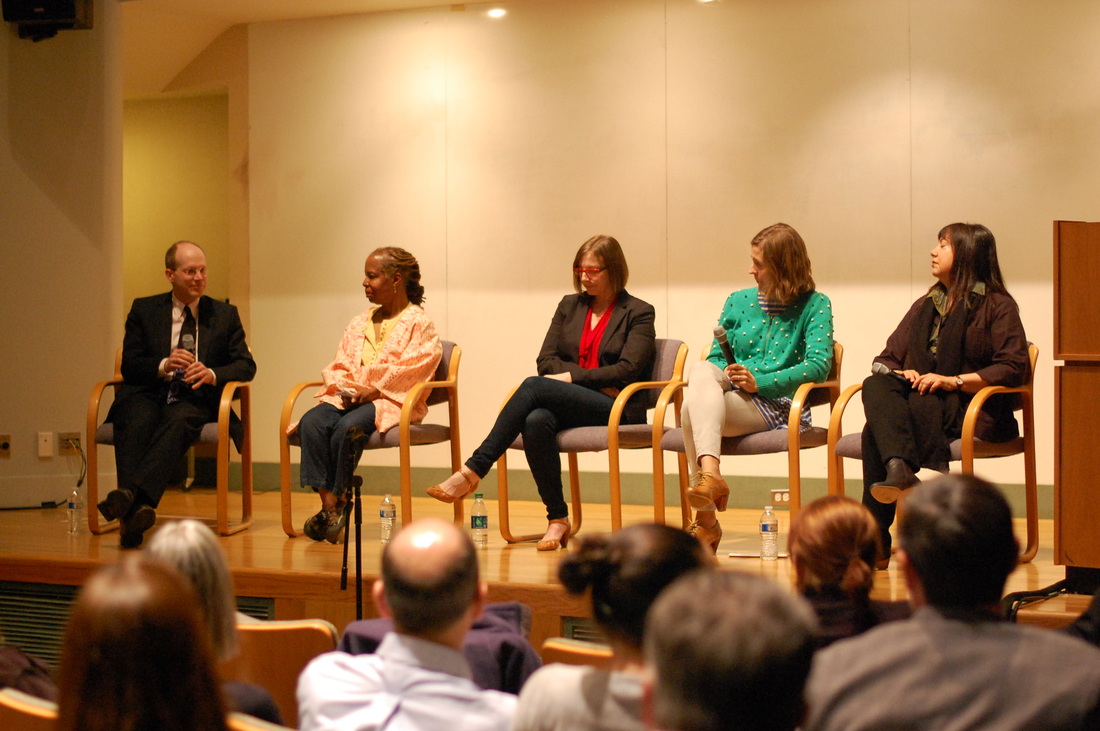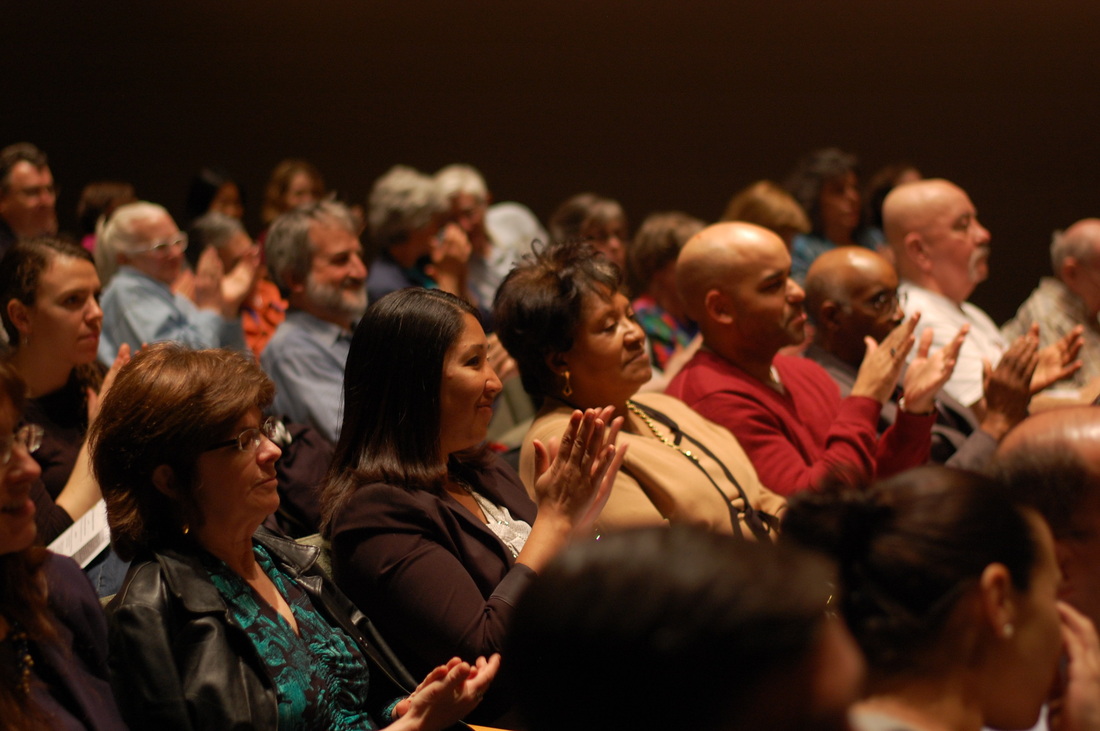|
On Thursday, April 10th, I had the pleasure of participating in The Drama of DNA: Genomics on Stage Workshop, which was co-hosted by the National Human Genome Research Institute of the National Institutes of Health (NHGRI) and the Smithsonian Associates. I was joined by D.C. area playwrights Renee Calarco, Joshua Ford, D.W. Gregory, Ron Kampeas, Ari Roth, John Strand, Gwydion Suilebhan, Richard Washer, Irene Wurtzel, and Laura Zam. I was delighted to see my colleagues from Arena Stage, Linda Lombardi (Literary Manager) and Amelia Powell (Casting Director) and also, Shirley Serotsky (Associate Artistic Director of Theater J/director of the staged readings) there as well. What was unique about this experience was that several scientists took part in the conversation as well. Among them were Vence Bonham, Lawrence Brody, Lynn Bush, Jim Evans, William Gahl, Sara Hull, Philip Shaw, and Eric Green, Director of the National Human Genome Research Institute (NHGRI). With the help of photographers Maggie Bartlett and John Daniels, I was able to capture our experience: Lovely Van Ride and Fancy Coffee MachinePre-workshop Mix and MingleIntroduction and WelcomeWe met at 9:30am for coffee, tea, and light refreshments, including many wonderful and delicious flavors of Chobani. We were also treated to homemade pumpkin bread! Caffeine and food are excellent unifying forces across multiple disciplines! We received a warm and enthusiastic welcome from both Dr. Eric Green, the Director of the National Human Genome Research Institute, and Karen Rothenberg, J.D., M.P.A., the Senior Advisor on Genomics and Society to the Director, National Human Genome Research Institute. Karen reiterate our reason for coming together: "The purpose of this workshop is to generate dialogue about the intersection of science and the theatrical arts among participants with interest and expertise in science, medicine, bioethics, policy, education and the theatrical arts. The workshop will also seek to stimulate a community of playwrights and theatre professionals interested in engaging with scientists to encourage public discourse on issues related to biomedical research and genomics." As part of preparation, Karen shared a chapter from her book, The Drama of DNA: Narrative Genomics, which she co-authored with Lynn Bush. As with this workshop, the book explores the intersection of drama, genetics, genomics and bioethics. Panel 1: Uncovering the Drama in Science Moderated by Karen Rothenberg with panelists: Dorothy Fortenberry (Good Egg), Lisa Loomer (Distracted), Cassandra Medley (Relativity), and Anna Ziegler (Photograph 51). Theater J’s Artistic Director, Ari Roth served as the guest respondent. This panel explored the interest of playwrights and theatre professionals in genomics, the process of writing in this area, and the challenges involved in creating and producing theatre related to genomics. Karen asked each of the playwrights to speak about what had inspired their plays and how they went about the process of learning the science. Dorothy shared that the Good Egg was based on family history. In this play, she explores the impact of bipolar disorder on individuals and families, and the possibility of being able to test in vitro embryos for the bi-polar gene. While the science isn’t there yet for such a test, the possibility makes for an interesting and complex dilemma. Still, she read books, magazine features, and newspapers articles. She also connected with a scientist. Lisa identifies herself as a political playwright and is inspired by what’s going on her life and what’s going on in the news and world around her. Her play, Distracted, asks what does it mean to be ADD in an ADD world and who benefits from such diagnosis of children. When conducting research, Lisa asked herself if it was possible to have too much science in the play. Also, she found that the facts were less important that the relationships between characters and the impact that the science had on the lives of the characters. Distracted was commissioned by the Mark Taper Forum and they brought in experts on various topics. Her creative researched came from books and the feedback from the experts. Cassandra shared that she draws stories from everyday life. Her play, Relativity, was inspired by a conversation she overhear a dinner party. Two history students were discussing a pamphlet they had received, which explained that if you of color, your melanin provided you with certain beneficial properties, an inherent racial supremacy of sorts. She was so intrigued that she immediately followed up with research to learn more and received a commission from the Sloan Foundation to develop the play. She even spoke with melanin scientists and worked with a geneticist, who could offer a counter argument. Also, Cassandra was able to keep a decent amount of the science in the play because the scientist presents her findings at a conference. Anna explained that she had been commissioned by Maryland-based theatre company, Active Cultures, to write a play about three women scientists: Rachel Carson, Rosalind Franklin, and Roger Young-three women who loved science and changed the world. After the reading at the Kennedy Center’s Page-to-Stage Festival, Anna was more drawn to the story of Rosalind Franklin. As happens, I served as dramaturg on this world premiere of what would become Photograph 51. Throughout the process, Anna did as much research as possible, but wanted to present the science as clearly as possible and in a way that she understood it. This way, an audience of non-scientist would understand the world of the play as well. Ari Roth, shared that one of the main reasons to marry science and art was to promote understanding and literacy. The human condition, which includes our health and relationship to technology is inherently dramatic and there is much to mine in way of storytelling. Among many of the playwrights, myself included, there is a deep interest and appreciation in the sciences and also a strong desire to help people understand that science is a beautiful endeavor and intimately intrinsic to our lives. Panel 2: Real‐life Drama and the Future of Genomics Moderated by Lawrence Brody with panelists: James Evans, William Gahl, Sara Hull, and Philip Shaw. This panel addressed the drama involved in the clinical and research use of genomics, including discussion of case studies and emerging trends in genomics, and it was thrilling! As the scientists shared some of their most intriguing case studies, I sat with my mouth agape. They were mindful and obliged to keep patient confidentiality, but shared enough about psychological conditions and medical circumstances for us to understand the ethical dilemmas that many scientists and clinicians face. I couldn't take notes fast enough and saw the my theatre colleagues were deeply affected as well. Selfishly, I decided to take art in this workshop because my new play, Among These Wild Things, addresses science, religion, and art. The lead character, Jesse Lee, is agnostic and a geneticist, whose research is centered on identity, race and genetic variation. She’s married to Nigel, an art historian, who recommits to his Jewish faith after the loss of his grandfather. Once he does, their marriage is put to the test. I knew this workshop would help me understand Jesse's world better and I'm thrilled to announce that I'll working with Vence Bonham to learn even more. Now, as I said, I took notes furiously. I was listening for situations that might resonate with my character. Here's what stood out most to me:
Discussion: Fostering a Dialogue between the Arts and SciencesModerated by Vence Bonham, this open discussion considered ways to encourage the greater interaction between the arts and sciences and the use of theatrical arts as a means of promoting public discourse related to scientific. We talked about possible commissions and ways that scientists could participate in community engagement initiatives related to productions. We shared how working with scientists early in the writing and rehearsal process was beneficial to theatre artists. Someone suggested possible embedded residencies in science labs or observing clinician during consultations. We even addressed the need to make room for conflict. Meaning, while the artists could certainly help get information out to the public about new discoveries and advances, there must also be room to dramatize the emotional and ethical push back. While organizationally this may prove challenging (and would in any discipline), therein lies the drama of the human condition that we're all interested in exploring. All in all, it was a worthwhile and invigorating experience. I was delighted to learn that this would be the first of many collaborations. Theatre has a long history of addressing social, political, and cultural issues. The sciences—especially the intricate, rich, deeply personal, and ethical complexities of genomics and genetics—have an enormous impact our everyday lives. When theatre artists and scientists work together, we can open up, clarify, and engage with scientific literacy, which may not be understood by society at large. Doing so will not only break down the barriers that often exist between scientists and the public, but also encourage learning and curiosity. It is the hope of many in the room that by having a greater understanding of the role and impact of genomics on human biology, we can improve our health and medical practices. 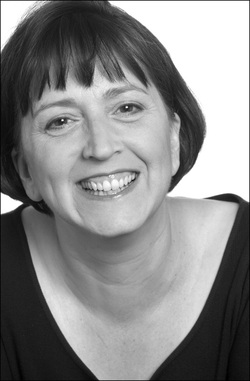 On our way out, my dear friend and fellow playwright, D.W. Gregory (Radium Girls), shared her thoughts about her experience and kindly allowed me to share them here: "The discussion overall was really intriguing; but what captured my interest was a statement made by William Gahl, who is also the Director of Undiagnosed Diseases at NIH. He said that a patient without a diagnosis has no credibility -- not only with coworkers, friends and family, but also with the medical establishment. He told the story of a woman with an undiagnosed ailment that affected her in strange, horrible ways. One weekend she stubbed her toe. Because of her condition this minor accident led to fatal consequences. She called her primary care doctor on a Saturday to report the problem, and he essentially said "take two aspirin and call me on Monday." By Monday she was septic, and she died. It hit me that this lack of credibility she suffered was also with herself--because she didn't reject the doctor's counsel and go straight to the emergency room. Even though her experience to that point would have suggested she probably should have. She tried self-care, which was a fatal error. And it strike me now how badly we need answers in this culture. When we don't have them, we when can't find them in medicine, we categorize the sick person as a crank, a crazy, a hypochondriac. But in reality, modern medicine is often at a loss -- there are strange conditions and ailments that affect people, and there are no answers. No one can figure it out. And it's a great tragedy that so many people have to suffer needlessly in order for the rest of us to maintain what is really a self-delusion---that there are always answers to be had. That science has everything under control. It doesn't." The Drama of DNA: Genomics in PerformanceLater that evening, “The Drama of DNA: Genomics on Stage,” performances took place at the Smithsonian’s Dillon Ripley Center. The readings and post show discussion were part of the ongoing educational outreach for the “Genome: Unlocking Life’s Code” exhibit at the Museum of Natural History. It featured staged readings of scenes from Dorothy Fortenberry's Good Egg, Lisa Loomer's Distracted, Cassandra Medley's Relativity, and Anna Ziegler's Photograph 51 were presented under the direction of Shirley Serotsky, Theater J's Associate Artistic Director. “Spending the morning at the NIH speaking with some of the world’s leading scientific minds; and then the afternoon rehearsing these wonderfully detailed and layered scenes (with the gift of having the playwrights in the room) was an honor and a treat," Serostky said. "My father has been a science educator for over forty years. The passion he has for science in no small way inspired the passion I have for theater. These two communities can intersect and overlap in meaningful and productive ways.” Please enjoy these lovely photos from the event: Anna Ziegler introduces Photograph 51About the PlayJames Watson and Francis Crick received the Nobel Prize for their work modeling the DNA molecule. But did they steal data from a female colleague and claim credit for themselves? Based on a true story, the provocative Photograph 51 explores sexism, ethics, and scientific collaboration through the recounting of how passionate biophysicist Rosalind Franklin provided the key breakthrough leading to the DNA discovery. Cassandra Medley introduces RelativityAbout the PlayKalima, a young, ambitious, up and coming Bio‐geneticist has a beloved mother, Claire, who is celebrated within several small African‐American intellectual circles as a “Melanin Scientist.” Claire is a leading proponent of the belief that “people of color of physically, mentally, emotionally superior to others because of the supposed larger concentration of melanin in their skin. Circumstances force the Kalima to have to decide whether to publicly denouncer her own beloved mother’s lifetime career, and save her own professional reputation, or to hold fast to her mother’s approval, and emotionally sustaining love. Relativity is a play about melanin, DNA, and family. Lisa Loomer introduces DistractedAbout the PlayWhat’s going on with nine year old Jesse? He can’t sit still, he curses, he raps, you can’t get him into—or out of—pajamas. His teachers think it’s ADD. Dad says, “He’s just a boy!” And Mama’s on a quest for answers. Is it “dysfuncton” or “difference?” And what’s ADD in an ADD world? She consults a psychologist, a homeopath, an environmental physical, a shrink. She talks to neighbors—whose kids have their own diagnoses. A psychiatrist prescribes Ritalin. Throughout, Jesse is an offstage voice, becoming more and more desperate. And will his parents’ marriage survive the quest for a diagnosis? Everyone is distracted‐‐including an actor who can’t stay in character. Distracted is a look at a modern family and an epidemic dilemma: Are we so tuned into our 27/7 info‐rich world that we’ve tuned out what really matters? Dorothy Fortenberry introduces Good EggAbout the PlayFor as long as she can remember, Meg has been taking care of her younger brother Matt – through their childhoods, after their parents died, and especially after his diagnosis of bipolar disorder. Now in their twenties, Meg and Matt live together in Washington, DC, where she’s a Congressional researcher, and he’s a freelance web designer. She’s organized, he’s chaotic. She’s tidy, he’s creative. And she’s getting pregnant – with the help of a sperm donor and IVF. Good Egg takes place on the night before her in vitro embryos undergo genetic testing, a procedure known as Preimplantation Genetic Diagnosis or PGD. Matt's discovery that Meg plans to screen her embryos for bipolar disorder sets off a cavalcade of decisions and revelations, and neither sibling will ever be the same. Over the course of the play, the action switches from their apartment to Meg’s womb to Matt’s brain and back, as they struggle with their individual desires and shared need for family. As the night wears on and Matt’s medication wears off, both of them are pushed irrevocably to the limits of unconditional love. Post Show DiscussionPlaywrights Dorothy Fortenberry, Lisa Loomer, Cassandra Medley, and Anna Ziegler spoke with Jack Evans about how and why they transformed complex topics rooted in genetics—including issues of identity, the power of genetic information, and the impact of health decisions on family dynamics—into compelling theater. A diverse, enthusiastic, and rapt audience!
2 Comments
4/23/2014 03:56:00 pm
Terrific blog post. Thanks so much for writing this, Jacqueline! I wasn't able to attend and really wanted to know what happened. This gives a great sense of the day and its variety and some of the very diverse themes and questions and work presented. Much appreciated!
Reply
Sydney Cheek-O'Donnell
5/14/2014 08:56:25 am
Thank you for sharing this! You mentioned that this is going to be the first in a series of events around this subject. Do you know anything further about when the next one will be held, or where I can find more information on upcoming events similar to this? My colleague, Gretchen Case, and I are working on an initiative directly related to this event, so we're eager to make contact with others interested in this area of research/playwriting.
Reply
Your comment will be posted after it is approved.
Leave a Reply. |
My BlogI'm a playwright, dramaturg, and teaching artist. It is here where you'll find my queries and musings on life, theater and the world. My posts advocate for diversity, inclusion, and equity in the American Theatre and updates on my own work. Please enjoy!
Categories
All
Archives
June 2020
Reading List
|


